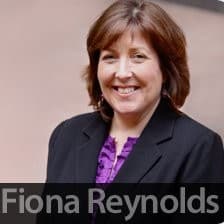
The Evangelical Lutheran Church of Finland asked funds for their Principles for Responsible Investment (PRI) assessment reports and used data analysis on their environmental, social and governance factors from Impact-Cubed when awarding its latest equity mandate.
Magdalena Lönnroth has worked at the Church Pension Fund in Finland since January 2006 and is portfolio manager and head of responsible investment. She told Markets Media: “We have three segregated equity mandates, two are Finnish and one is European. We issued a request for proposal for the European mandate and one added opportunity was proxy voting.”
The Church pension fund was established in 1991 and has believed in responsible, or ethical, investment since its launch, and committed to the United Nation’s PRI in 2008. The UN established the PRI in 2005 as the world’s largest investor network on sustainable investing. The network now has more than 2,250 signatories, representing $83 trillion of assets under management, to its six principles. Signatories are required to report to the PRI on annual basis.
The pension scheme outlined guidelines for responsible investment in 2014 and adopted a climate change strategy in December 2016 to consistently reduce the carbon footprint of its investments, which was updated last year. Lönnroth continued that the fund’s external asset managers are required to integrate ESG into their investment process and the fund assesses them on a continuous basis, including an annual ESG questionnaire.
“For the RFP we asked for the fund’s PRI assessment report for the first time,” added Lönnroth. “We also received data analysis from Impact-Cubed.”
Impact-Cubed has a “portfolio impact footprint” tool which was originally built in-house for hedge fund Auriel Equity Investors, before being spun off as a separate company in 2017.
Lönnroth added: “We had used Impact-Cubed for some case studies and were familiar with their model. I believe this will become a standard process for future fund searches.”
The pension fund issued the RFP in November last year and awarded the mandate to LähiTapiola Asset Management.
Impact-Cubed
Larry Abele, partner at Auriel Equity Investors, said in email that Impact-Cubed is receiving more requests to assess ESG funds.
“We’re happy to be able to say that we’re at a stage where we’re working both with large established players in the sustainability space who have put a lot of thought into ESG over the years, and investors only just starting out with sustainability to whom we can be helpful in beginning to unpack what is a very complex set of issues,” Abele added.
He continued that there has been a big shift amongst investors towards wanting more purely data-driven measurement of sustainability.
“With tools such as algorithmic data processing like we use at Impact-Cubed, we’re able to quality assure and estimate data to a higher standard and for larger universes than ever before,” said Abele. “This data-driven sustainability measurement is less prone to analyst bias and bias inherent in proprietary methodologies or in-house self-reported ESG measurements, which acts to complement and validate these more traditional approaches.”
Impact-Cubed can measure the active exposure of any basket of securities against a benchmark across 14 ESG factors. The firm uses publicly reported data that falls into ESG, and is aligned to the UN sustainable development goals (SDGs). Last year Impact-Cubed was one of the two winners of the Investor Responsibility Research Center Institute’s annual investor research competition.
The paper, Measuring the Sustainability Impact of 25 European ESG Funds, was co-authored by Abele and colleague Antti Savilaakso. The research found that the funds had an active ESG share of only 4% to 5%, meaning that sustainability issues only caused a 4% to 5% difference from a portfolio that did not consider sustainability.
“We built the Impact-Cubed model to push for more accountability in the sustainable and responsible investment community,” said Savilaakso in a statement. “The apparent lack of accountability as demonstrated by our research waters down the potentially transformative power of responsible investments when ESG funds are more green marketing than real changes in how we invest.”
Abele continued that there have also been some positive surprises from funds that are not heavily marketed as ESG but actually have very strong active exposures to sustainability.
Disclosure
Lönnroth said there has been a dramatic change in sustainable investing.
“It used to be viewed as something that was only of interest to the Church but now it has spread across the whole asset management industry,” she added. “Now many managers actively bring us ESG ideas and nearly all have signed up to the PRI commitments.”
She continued that she is optimistic on the continued growth of sustainable investing.
“New European Union regulation will push reporting forward and from next year PRI signatories will have to report according to the TCFD recommendations,” added Lönnroth.
Good news for ?? and ?! @Europarl_EN and @EUCouncil reached an agreement on sustainable investment disclosure rules.
?#SustainableFinanceEU ?
More ℹ️: https://t.co/VTor5wFyaa#greenfinance #CMU #SustainableDevelopment #CircularEconomy #ClimateNeutralEU #ESG #ParisAgreement pic.twitter.com/r8pjUwtdyY— EU Finance ?? (@EU_Finance) March 7, 2019
The Financial Stability Board’s Taskforce for Climate-related Financial Disclosures (TCFD) published recommendations in June 2017 for voluntary reporting to help lenders, insurers, and investors assess companies on sustainability. Despite the disclosures being voluntary, more than 480 investors representing $42 trillion have chosen to complete the indicators and submit responses.
This year the climate indicators will again be voluntary but from 2020, it is the PRI’s intention to make some climate indicators mandatory to report but voluntary to disclose.
Fiona Reynolds, chief executive of the PRI, said in a statement: “It is increasingly important for investors to incorporate emerging mega risks such as climate change into their view of the future. TCFD provides the best available framework for systematically including climate-related risks and opportunities into investment strategy.”
Abele said there is a big focus amongst investors on carbon and the TCFD framework has catalysing fund managers to carry out climate scenario analysis.
In addition, he said investors are thinking in terms of the sustainability of a product or service itself, whereas it has traditionally been possible for a company to be well-rated for ESG even if its products are harmful.
“The SDGs have sparked this change and so we’ve seen the emergence of datasets that classify company activities according to their alignment with the SDG goals, as is part of the Impact-Cubed model as well,” said Abele. “These datasets didn’t exist a few years ago, the closest being negative screening data, so we’re seeing here an ESG data trend that reflects a decisive shift towards more holistic thinking about the effects of the corporate activities we finance on our world.”









